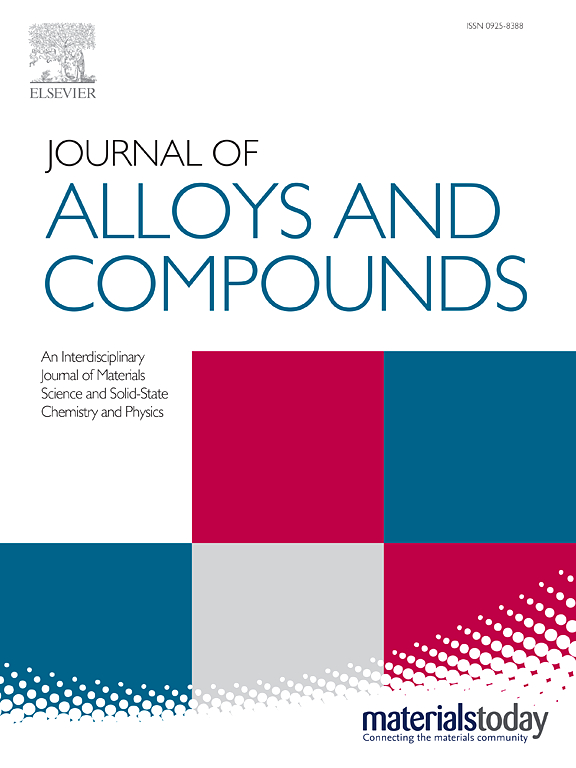Microstructure, room-temperature mechanical properties, and oxidation resistance of Ti-added Mo-Si-B alloys fabricated via hot pressing sintering
IF 5.8
2区 材料科学
Q2 CHEMISTRY, PHYSICAL
引用次数: 0
Abstract
Microstructure, room-temperature mechanical properties, and oxidation resistance of Mo-12Si-8B-xTi (x = 10, 20, 30, 40, at.%) alloys fabricated via hot pressing sintering are investigated. 10Ti and 20Ti alloys comprise α-Mo + Mo3Si + Mo5SiB2, whereas 30Ti and 40Ti alloys comprise α-Mo + Mo5SiB2 + Ti5Si3. CALPHAD thermodynamic modeling and EDS indicate a significant increase in Ti solubility in α-Mo and Mo5SiB2 phases with higher Ti content, reaching levels of 30–50%. EBSD analysis reveals evident grain coarsening, the average grain size improves from 1.43 to 2.97 μm. HRTEM characterization demonstrates α-Mo/Mo5SiB2 and α-Mo/Ti5Si3 interfaces are both incoherent. 10Ti alloy exhibits the highest flexural strength of 454 MPa and fracture toughness of 9.9 MPa‧m1/2, while minor differences in fracture toughness are observed among 20–40Ti alloys. The combination of adequate α-Mo matrix, appropriate grain size, and brittle intermetallic phases collectively contribute to determining the strength and toughness. Simultaneous thermal analysis and cyclic oxidation show 40Ti alloy offers the best oxidation resistance at 800–1200 °C, because of the protective TiO2‧SiO2 layer generated through selective oxidation of Ti5Si3 and Ti/Si. Using Pilling-Bedworth ratio as the sole criterion to assess the oxidation resistance is inadequate, as temperature and phase constitution must be considered.通过热压烧结制造的添加钛的 Mo-Si-B 合金的微观结构、室温力学性能和抗氧化性
研究了通过热压烧结制造的 Mo-12Si-8B-xTi(x = 10、20、30、40、at.%)合金的微观结构、室温机械性能和抗氧化性。10Ti 和 20Ti 合金由 α-Mo + Mo3Si + Mo5SiB2 组成,而 30Ti 和 40Ti 合金由 α-Mo + Mo5SiB2 + Ti5Si3 组成。CALPHAD 热力学建模和 EDS 显示,随着钛含量的增加,钛在α-Mo 和 Mo5SiB2 相中的溶解度显著增加,达到 30-50% 的水平。EBSD 分析显示出明显的晶粒粗化,平均晶粒尺寸从 1.43 微米提高到 2.97 微米。HRTEM 表征显示,α-Mo/Mo5SiB2 和 α-Mo/Ti5Si3 界面都不连贯。10Ti 合金的抗弯强度最高,为 454 兆帕,断裂韧性为 9.9 兆帕‧米1/2,而 20-40Ti 合金的断裂韧性差异较小。足够的 α-Mo 基体、适当的晶粒尺寸和脆性金属间相共同决定了合金的强度和韧性。同时进行的热分析和循环氧化表明,由于 Ti5Si3 和 Ti/Si 的选择性氧化产生了 TiO2‧SiO2 保护层,40Ti 合金在 800-1200 ℃ 下具有最佳的抗氧化性。将 Pilling-Bedworth 比率作为评估抗氧化性的唯一标准是不够的,还必须考虑温度和相构成。
本文章由计算机程序翻译,如有差异,请以英文原文为准。
求助全文
约1分钟内获得全文
求助全文
来源期刊

Journal of Alloys and Compounds
工程技术-材料科学:综合
CiteScore
11.10
自引率
14.50%
发文量
5146
审稿时长
67 days
期刊介绍:
The Journal of Alloys and Compounds is intended to serve as an international medium for the publication of work on solid materials comprising compounds as well as alloys. Its great strength lies in the diversity of discipline which it encompasses, drawing together results from materials science, solid-state chemistry and physics.
 求助内容:
求助内容: 应助结果提醒方式:
应助结果提醒方式:


